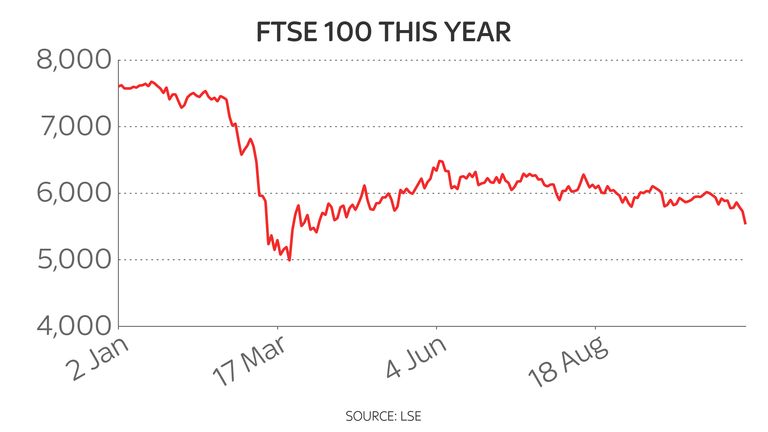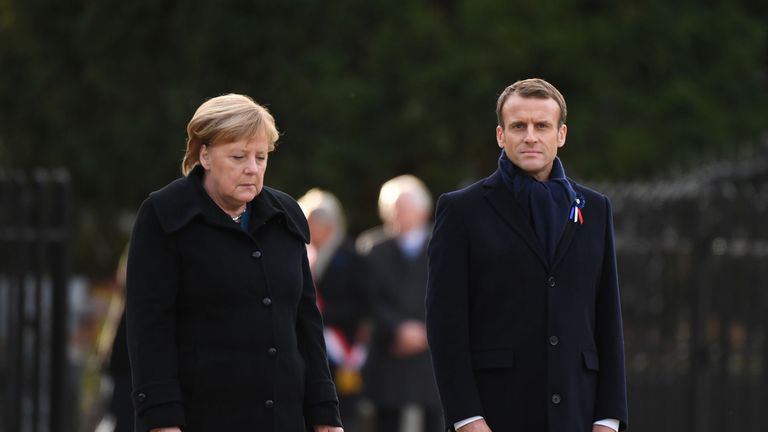The FTSE 100 has fallen to its lowest level in six months as financial markets react to surging coronavirus infections across large parts of the world.
There was a sea of red for stocks across Europe and the United States in Wednesday trading over fears of a deeper than expected hit to the global economy in the months ahead.
The FTSE 100 was more than 3% down in afternoon trading at one stage with all of its constituent companies, bar Rolls-Royce, losing ground. It closed 2.6% lower at 5,582.
The domestically-focused FTSE 250 lost almost 2%.
The situation was worse across the Channel as the CAC in Paris and Germany's DAX also fell sharply - the latter almost 5% lower at one stage.
While in New York, the Dow Jones Industrial Average was trading 3% lower as even technology companies - darlings of the market in recent months - felt the pain as investors fretted over political stalemate on additional aid for consumers and businesses.
As the Nasdaq plunged by more than 3% Edward Moya, senior market analyst at Oanda, wrote: "Nothing should compare to the selloff that occurred in the spring, but right now virus concerns, lack of stimulus, and election outcome uncertainty have forced investors to scale down their reopening bets."
Analysts in Europe pointed to growing concerns about the effect the coronavirus pandemic could have during the winter, after reports that the second wave could be more deadly than the one seen during spring.
Deutsche Bank's Jim Reid said: "The problem with the second wave is that although we are far better prepared than we were for the first wave, the reality is that the first wave occurred late in the traditional flu/cold/virus season.
"The second wave still hasn't even hit November or December yet and we're still seeing cases soar in many places."
Parts of the UK have already brought in tighter restrictions in an effort to halt the virus, as the number of new cases hovers around 20,000 a day.
There are fears that these restrictions - especially if they spread to cover more of the country - will reverse the tentative economic recovery seen during the summer.
The UK's Vaccine Taskforce boss has warned that the first generation of vaccines "is likely to be imperfect" and "might not prevent infection".
A study also found that the number of people with antibodies fell 26% since lockdown was eased over summer.
A safe and effective vaccine is seen as one of the few ways for the world to move past the pandemic - the other being a widely-effective cure.
The global market reaction reflects jitters over the weeks and months ahead - particularly in Europe.
This comes as fears grow of a new national lockdown in France, with president Emmanuel Macron to give a televised address later tonight.
Reuters has reported that Germany's chancellor Angela Merkel wants to close restaurants and bars from 4 November.
John Woolfitt, director of trading at Atlantic Capital Markets, said: "Global markets look incredibly nervous - the mix of rising COVID-19 cases and deaths and the potential full lockdown in France, add this to the uncertainty ahead of the US elections and you have a very poor backdrop.
"I don't expect this to be long-term, but nervousness will continue until elections are done and some form of steadying in the COVID-19 numbers."
https://news.google.com/__i/rss/rd/articles/CBMidWh0dHBzOi8vbmV3cy5za3kuY29tL3N0b3J5L2Nvcm9uYXZpcnVzLWZ0c2UtMTAwLWhpdHMtc2l4LW1vbnRoLWxvdy1hcy1mZWFycy1ncm93LW9mLXNlY29uZC1uYXRpb25hbC1sb2NrZG93bi0xMjExNjcyMtIBeWh0dHBzOi8vbmV3cy5za3kuY29tL3N0b3J5L2FtcC9jb3JvbmF2aXJ1cy1mdHNlLTEwMC1oaXRzLXNpeC1tb250aC1sb3ctYXMtZmVhcnMtZ3Jvdy1vZi1zZWNvbmQtbmF0aW9uYWwtbG9ja2Rvd24tMTIxMTY3MjI?oc=5
2020-10-28 15:32:17Z
52781151644280




Tidak ada komentar:
Posting Komentar